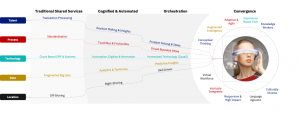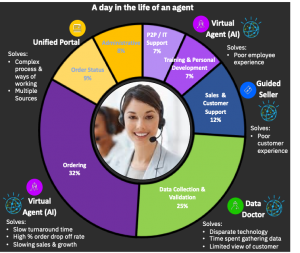About cookies on this site Our websites require some cookies to function properly (required). In addition, other cookies may be used with your consent to analyze site usage, improve the user experience and for advertising. For more information, please review your options. By visiting our website, you agree to our processing of information as described in IBM’sprivacy statement. To provide a smooth navigation, your cookie preferences will be shared across the IBM web domains listed here.
Perspectives
CFO: the restless reinventor – Chapter 2
17 September, 2019 | Written by: Rupert Clegg and Bob Booth
Categorized: Perspectives
Share this post:
The CFO and the path to personalisation
In the first chapter of this series we discussed the market forces that are revolutionising global business paradigms, and the pressure those shifts are putting on the CFO role. Here, we will explore the drive towards personalisation, and the responsibility of the CFO to harness the opportunities this offers.
In this context, personalisation is the enhancement of the workforce’s ability to support intelligent decision making through a combination of unprecedented insight and interaction within all business operations. It’s quite a shift from the traditional focus on transactional processing, efficiency and effectiveness that remains at the core of many shared service organisations.
Just as mobile devices are driving individual choice and personalisation of services at home, so the industry is moving to more personalised toolsets that augment workers’ capabilities and provide real-time insight. This trend is already well underway, with an abundance of mobile reporting and business support applications available today.
Over the next five years, CFOs will be challenged to harness technology to build fully-fledged “virtual shared services”, as illustrated below.

The CFO will need to spearhead a fundamental shift to accommodate this new way of working, enabled by a hybrid workforce of intelligent robots and augmented employees. Cognitive machines will increasingly take over basic transactional processing and reporting; no-touch and light-touch processing will become the norm.
Augmented employees will specialise in human interaction, insight and real-time decision making. New, personalised capabilities will be used to improve customer engagement and accelerate innovation, driving additional revenue opportunities as a result.
Work will move seamlessly between augmented, skilled individuals, operating in a digitised ecosystem. The specific work requirement will be matched to the individual with the capability and specialism suited to the task. In other words, work will be personalised to their capability. A virtual shared service model will evolve to better manage these new capabilities; the ability to work in a virtual team will become a covetable workforce skill.
Language will no longer determine shared service location so much as individual capability. The shared service workforce will undoubtedly improve in terms of agility and insight to better support the core business.
Personalisation provides opportunities to supercharge revenues and amplify customer engagement. But it has to be done right. That means it has to be built on genuine customer insight, the kind that is only possible through a combination of technology and human intelligence. CFOs who succeed at this are those who ask questions before they presume to know the first thing about their customers’ wants and desires.
In 2018, IBM helped a global telecommunication provider to achieve personalisation, implementing the IBM Maestro Platform to support customer (lead-to-cash) engagements with shared service agents. This resulted in $3.6 million additional savings per month, a 36% productivity improvement and a doubling of order cycle speed. The more personalised role of workforce agents is depicted below:

Personalisation is not just about enhancing existing service operations; it is set to become the fundamental core of all future shared service operations. CFOs may be well out of their comfort zone. But the real fear is just how fast this technology is moving and transforming their potential competitors today.
Check back soon for the next chapter, get in touch or visit our website to find out more

Rupert Clegg
Finance Practice Leader, IBM Global Business Services, Europe

Bob Booth
Vice President, Cognitive Process Reengineering, IBM Services Europe
More stories
By Helen Gowler on 3 October, 2024
Generative AI: driving a new era of HR transformation
Helen Gowler, Partner, EMEA Talent & Transformation Lead Today, I’m proud to be part of a company that’s committed to addressing gender bias in the tech industry. IBM is pioneering the use of AI to tackle this issue, and I’m excited to contribute to this effort. Our team is developing AI models that can detect […]
By Mark Restall on 18 July, 2024
Multi-Modal Intelligence Platform
Traditionally, data management systems provided only numerical or textual based business intelligence primarily for back-office users across finance, sales, customer management and supply chain. Today, we are increasingly seeing data management systems which drive key business functions requiring interrogation of multi-modal data sets from documents, presentations, images, videos to audio. This demands a more sophisticated […]
By Mark Restall and others on 16 July, 2024
The use of GenAI to Migrate and Modernise Organisational Core Programming Languages
GenAI is hugely powerful and supports a diversity of use cases by focusing on routine work – allowing people to focus time on value-add tasks, thus enhancing productivity. The focus of this use case is for an organisation which had previously focussed on a legacy set of tooling and programming languages and needed a way […]





























